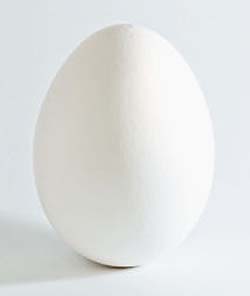

Brown eggs come from brown hen varieties. They are costlier because brown breeds are larger and consume more feed. Photo by Peter Rol| SXC.
January 2008
Last updated March 2010
|
 |
All About Eggs
Page 1: Egg Nutrition & Health Benefits
This is Page 1 of a two-page article. Click on the black links below to visit other pages. Also see Types Of Eggs.
Egg Nutrition
For an average of just 12 cents each, eggs provide varying amounts of 13 important nutrients, including high-quality protein, choline, riboflavin and vitamin B12.
- Calories. A large egg has 75 calories, and packs a lot of protein and other nutrition to satiate hunger. The yolk provides the majority of the 21 vitamins and minerals, including about 40% of the protein. The lutein and zeaxanthin found in the yolk are thought to protect the eye from damage due to aging associated with ultraviolet light exposure, cataract development and age-related macular degeneration. It also contains 6.29g protein, 27g calcium, 6mg magnesium, 96mg phosphorus, 67mg potassium, 244 IU vitamin A and 4.97g total fat.
- Fat. A large egg has just 1.5 grams of saturated fat, and provides 2.6g of healthy mono- and polyunsaturated fats. It contains less than 0.5g of trans fats, which is the acceptable limit for foods to claim no trans fat content.
Health Benefits Of Eggs
According to the American Egg Board, research demonstrates that including eggs in the diet can help prevent common age-related conditions without negatively influencing the risk for heart disease. They can help preserve eyesight and maintain lean body mass as we age.
- Muscle Health. Sarcopenia, age-related muscle loss, generally starts to set in around age 45, when muscle mass begins to decline at a rate of about 1% each year.[1] Regular exercise and high-quality protein foods, like eggs, can help maintain lean muscle mass.
- Eyesight. Age-related macular degeneration (AMD) is the leading cause of blindness. Research suggests that lutein and zeaxanthin, two antioxidants found in foods like egg yolks and leafy greens, may help reduce the risk of AMD by increasing macular pigment optical density. In fact, studies show that consuming one egg a day can significantly increase lutein and zeaxanthin levels without negatively impacting blood cholesterol or lipid levels.[2,3] Additional research has found that the lutein in eggs may be better absorbed by the body than it is from other sources, such as dietary supplements or spinach.[4]
|
|

Photo courtesy of Wikipedia.org. |
- Brainpower. According to a review published in The Journal of Nutrition, omega-3 fatty acids play a protective role against oxidative stress, thereby helping to minimize the loss of cognitive function that is associated with aging.[5] Omega-3 fatty acid-enriched eggs are a good choice for people who want to increase their intake of omega-3 fatty acids, but who do not regularly eat fish or like to take supplements.
[1] “Are you doing all you can to fight sarcopenia?” Health & Nutrition Letter. Tufts University. March, 2003.
[2]Wenzel, A.J., et al. A twelve-week egg intervention increases serum zeaxanthin and macular pigment optical density in women. The Journal of Nutrition. 2006; 136: 2568-2573.
[3] Goodrow E.F., et al. Consumption of one egg per day increases serum lutein and zeaxanthin concentrations in older adults without altering serum lipid and lipoprotein cholesterol concentrations. The Journal of Nutrition. 2006; 136: 2519-2524.
[4] Chung H.K., et al. Lutein bioavailability is higher from lutein-enriched eggs than from supplements and spinach in men. The Journal of Nutrition. 2004; 134:1887-1893
[5] Innis, S.M. Dietary (n-3) fatty acids and brain development. The Journal of Nutrition. 2007;137:855-859.
Continue To Page 2: Egg Facts & Tips
Go To The Article Index Above

|



